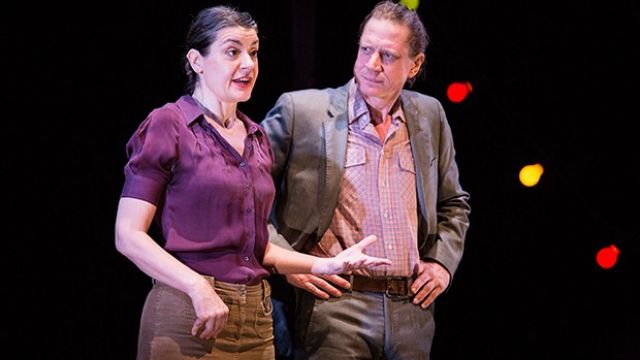Tomorrow’s Parties
Tomorrow’s Parties is not an easy show. Not easy to perform and not exactly easy to watch either.
That’s because it’s anything but conventional theatre: it’s a performance that isn’t very physical and doesn’t really progress in any substantial way. It’s two people speaking, in turn, about ideas of the future, often insightful and profound, but when it comes down to it, for a very long time.
The man and woman (Cathy Naden and Jerry Killick) stand next to each other on a wooden pallet, against a black curtain, with a set of coloured lights hanging behind them. That’s all there is on stage – the point is to focus on the ideas they explore. The two performers are relaxed, often playfully riffing off each other, sometimes competing. But the structure here is more like a set of monologues rather than a true dialogue.
“In the future,” they tell us, there won’t be any countries or, in the future, the world will be made up of feudal tribes. Or there won’t be any men or perhaps lots more men than women; it’ll be run by children or robots; people will take pills to live, or to die. The future may just be one big dream, or virtual world, that doesn’t require people to use our bodies. The possibilities go on.
Tomorrow’s Parties, imported from the UK, is part of Sydney Festival’s “About an Hour” series of productions at the Carriageworks arts centre. But this show runs closer to 80 minutes – and feels like a hard slog.
That’s no doubt part of the point: the Sheffield-based collective call themselves Forced Entertainment, after all. They aim to challenge the way theatre is performed, to use conversation differently or simply to confuse us. The idea in this piece is clearly to contemplate ourselves and decipher what the future, present and past mean to us (the proposition that the future isn’t very different to the present is particularly powerful). But ultimately, the piece sustains only about half its 80 minutes and then becomes tiresome.
Tomorrow’s Parties is innovative and technically, an accomplished performance. Naden and Killick are well-directed, sustaining an incredible energy through their collaboration. Their ideas are related clearly and often powerfully.
But ultimately I was underwhelmed (or was it overwhelmed?). This reaction is clearly subjective: more intellectual people may be enthralled in ways I couldn’t achieve. It’s a piece designed to be compelling and poignant – and many others may find it so. But for me, it isn’t easy to recommend.
Peter Gotting
Photographer: Jamie Williams
Subscribe to our E-Newsletter, buy our latest print edition or find a Performing Arts book at Book Nook.

